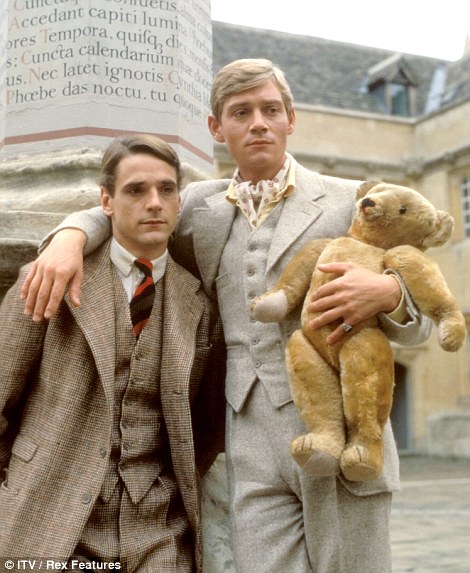Male Friendship in Literature (especially that which is new)
The problem emerges
 |
| Too painful at my age |
Upon a Friday evening spent alone, at home, I searched my DVDs for a story to keep me company and comfort me, specifically on the theme of friendship. I quickly became frustrated. Lord Of The Rings? Too long, too familiar and quite old. Brideshead? Much too painful for a man my age. Sherlock? Gets hysterical. Yet what else was there? Precious little.
So I turned to literature.
Lord Of The Rings? Brideshead? I could see a problem emerging: everything was either familiar or old. Or both.
I consulted the internet. There were a few more suggestions. Mice and Men? Please, I'm an English teacher. Lord Of The Rings was another. Brideshead Revisited another...
So I consulted my friend, Bryan. He suggested Lord Of The Rings, Mice and Men...but he added to the tally some suggestions from classic Russian literature, quite a lot of friendship in Shakespeare, including Hamlet and Horatio, and in 19th century prose, such as Bingly and Darcy and some others in Dickens. Then we discussed the problem over the phone, and agreed that, as far as we could tell, there was not much noteworthy writing on this theme from the last fifty years, and nothing we could name.
Then he made a couple of suggestions that really got me thinking. Maurice? Dorian Grey? No, I said. That would not do: they are romantic. But so what? What is the essential difference? I said at the time, and I think I was more right than I realised, that there was something delicate, mysterious, sweet and tantalising about friendship, especially between men, whereas depictions of romance are more obvious, predictable, digestible and, frankly, formulaic.
Digging further
Internet searches revealed a number of interesting things:
- Lists of 'top ten' etc. fictional male friendships are repetitive, and much of it is old
- Male friendship currently is better served in film and television than in literature
- From some quarters there appears to be even some hostility towards it featuring in new literature
- Given how lonely men are becoming, with around 2.5 million men having no friends, and how difficult men find it to make and keep friends, there is surely a need to discuss male friendship in current writing
- Male friendship makes people uncomfortable.
I want to dwell on points 2 and 5 together first.
Putting aside direct page-to-screen adaptations, I could name a few titles, not all of which I have seen, or seen in full, which take up this theme. The problem I have with them is that they intensify what I would call the histrionics, to the point where I no longer recognise the friendship for what it is. Take Sherlock, for instance. It starts really well: two lonely misfits who find one another, and, especially Watson, find new life through one another. However, by the third series, and through into the fourth, their relationship starts revelling in the caricatures and fantasies of the fan base (more on that later) and morphs deliberately into a surrogate romance. Similarly with House MD, which is obviously based on the Sherlock Holmes stories. When House has his difficulties or when Wilson starts to die, the dynamic becomes weepy and saccharine.
This speaks of two problems:
- Friendship is undervalued as a theme; less important than romance or family. Two close friends who remain close friends won't do, as friendship simply is not enough: they must become something more.
- Friendship is not understood. It is precisely because friendship is naturally undramatic, normally, that it is so important and valued: conversation, quality time, nights out, confidants' advice, etc. This is quite apart from the war of nerves, anxiety and high-stakes conflict and resolution that goes with romantic interest but which, by contrast, make romantic relationships less stable, reliable and all too often less enduring.
| This is mild. |
The other, connected problem is that this topic seems to make people uncomfortable, as hinted at in the link on point 3 but more evident in the fan responses to things such as Sherlock and Lord Of The Rings. It is a common suggestion, made in countless pictures and fan fictions either hopefully or sneeringly, that the men must secretly have romantic feelings for each other: 'Johnlock' is a thing, as evinced by fan art, the featured image being the mildest I feel I can show. And the conversations around Samwise Gamgee and Frodo Baggins seem deliberately to overlook the origin of that friendship in the model of the British officer and his batman in the trenches. Certainly, such treatments do touch on the real ambiguity of some male relationships, in which the line between the platonic and the romantic is not always clear to the friends themselves. But they also speak of a need either to laugh the friendship off or to transform it into something more easily understood and categorised; an inability, as Keats might have put it, to enjoy the mystery without the irritating reflex of reaching after certainty.
Writing now
 |
| Well reviewed and worth investigating |
I have mentioned 50/50 as a good modern treatment of male friendship that I know about, and the first two series of Sherlock as well. In terms of writing, I know of nothing very recent that has captured the public mood. I have heard of one title, At Swim, Two Boys, which seems promising but the synopses also indicate that the relationship becomes romantic. About a year ago I read The Gustav Sonata, which seemed promising at the start but quickly descended into the level of a first draft. It therefore seems to me that this is a topic and theme that is absolutely ripe for further exploration, both in pursuit of reading and of writing.
No comments:
Post a Comment